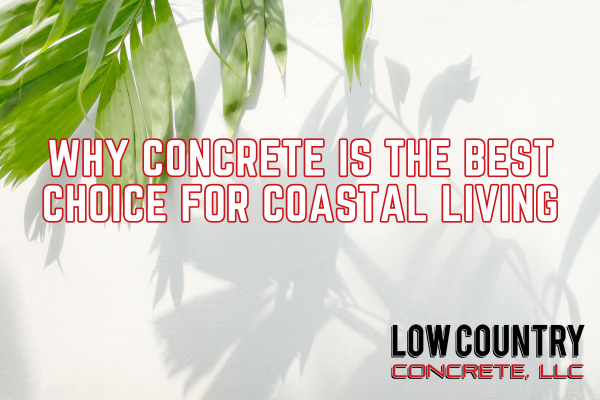Living in a coastal environment offers unparalleled beauty and a relaxed lifestyle, but it also presents unique challenges for home construction and maintenance. Low Country Concrete is here to help you protect your investment with the most durable materials for your next project.
From the salty sea breeze to high humidity and intense sun, the conditions along the coast can be harsh on building materials. For those looking to build or renovate in these areas, concrete stands out as the ideal choice for addressing these challenges. Concrete is the best choice for coastal living due to its durability, low maintenance requirements, and aesthetic versatility.
Durability Against Salt Exposure
One of the primary challenges of coastal living is salt exposure. The salty air can lead to corrosion and deterioration of many building materials, especially metals and wood. Concrete, however, is highly resistant to salt damage. This resilience comes from its dense composition and the ability of modern concrete mixes to withstand the corrosive effects of salt.
Concrete’s inherent resistance to salt exposure means it maintains its structural integrity over time, reducing the need for frequent repairs or replacements. When used in foundations, driveways, and other key structural elements, concrete ensures that homes and commercial properties remain safe and sound despite the relentless coastal conditions.
High Humidity and Moisture Resistance
The Low Country region is known for their high humidity levels, which can wreak havoc on traditional building materials. Wood, for example, can absorb moisture, leading to rot, warping, and other forms of deterioration. Similarly, some types of siding and finishes may not hold up well in such damp conditions.
Concrete, on the other hand, does not absorb moisture in the same way. Its non-porous nature makes it highly resistant to water damage, preventing issues like mold growth and efflorescence (white, powdery deposits on the surface). This moisture resistance ensures that concrete surfaces remain stable and aesthetically pleasing even in the most humid environments.
Heat and UV Radiation Resistance
The intense sun exposure characteristic of coastal areas can lead to premature aging of many materials. Wood can crack and fade, while some synthetic materials may become brittle or discolored. Concrete’s thermal mass allows it to absorb and retain heat, reducing the impact of temperature fluctuations on the material.
Modern concrete mixes can also include UV-resistant additives that help protect the surface from sun damage. This means that concrete surfaces—whether they are driveways, patios, or walkways—will maintain their color and structural integrity despite prolonged exposure to the sun.
Low Maintenance and Long-Term Savings
One of the major advantages of concrete is its low maintenance requirements. Unlike wood, which may require regular sealing and painting, or metal, which may need frequent rust prevention treatments, concrete surfaces are relatively easy to care for. Routine cleaning and occasional sealing are generally all that is needed to keep concrete looking its best.
This low-maintenance quality translates to long-term savings for homeowners. By reducing the need for frequent repairs and replacements, concrete can offer significant cost savings over the life of a property. Additionally, its durability means fewer disruptions and lower overall maintenance costs.
Versatility in Design and Aesthetics
While concrete is known for its strength and durability, it is also incredibly versatile in terms of design. Modern techniques allow for a wide range of decorative options, including stamping, staining, and polishing. This versatility means that concrete can be customized to complement various architectural styles, from traditional to contemporary.
In coastal settings, decorative concrete can mimic the appearance of natural stone, wood, or even tile, providing a high-end look without the associated maintenance issues. This makes concrete an attractive choice for driveways, patios, pool decks, and more.
Sustainability and Eco-Friendliness
Environmental considerations are increasingly important in construction, and concrete has several attributes that align with sustainable practices. For instance, concrete can be made with recycled materials, and its durability reduces the need for frequent replacements, which helps conserve resources.
Additionally, concrete’s thermal mass contributes to energy efficiency by helping to regulate indoor temperatures. In coastal areas, this can lead to lower heating and cooling costs, further enhancing the eco-friendliness of concrete construction.
Enhanced Safety and Stability
Coastal areas are prone to severe weather events such as hurricanes and heavy storms. Concrete’s robustness provides added safety and stability in these conditions. Its ability to withstand high winds and heavy rains makes it a reliable choice for building structures that need to endure extreme weather. Concrete foundations and walls can offer increased protection against damage from storm surges and flying debris.
Durability Meets Design
To illustrate the benefits of concrete in coastal settings, let’s consider a few examples. Many coastal homes utilize concrete for their foundations and structural components to prevent damage from saltwater and moisture. Additionally, concrete driveways and walkways are popular choices due to their durability and ease of maintenance.
In commercial applications, concrete is used for everything from parking lots to decorative facades. Coastal businesses that invest in concrete often find that it provides a long-lasting solution that can withstand the rigors of a busy environment while maintaining an attractive appearance.
Choose Low Country Concrete for Unmatched Resilience and Style in Coastal Living
Concrete is undoubtedly the best choice for coastal living due to its exceptional durability, low maintenance needs, and resistance to the unique challenges of salt exposure, high humidity, and intense sun. Its versatility in design also allows for a range of aesthetic options that can enhance both residential and commercial properties. For those building or renovating in coastal regions, concrete offers a reliable and cost-effective solution that stands the test of time.
If you’re considering a new construction project or renovation in a coastal area, Low Country Concrete is here to help. With its proven performance and adaptability, concrete can provide you with a beautiful, long-lasting foundation for your home or business. Contact us today to discuss how concrete can be the perfect choice for your next project.


Recent Comments